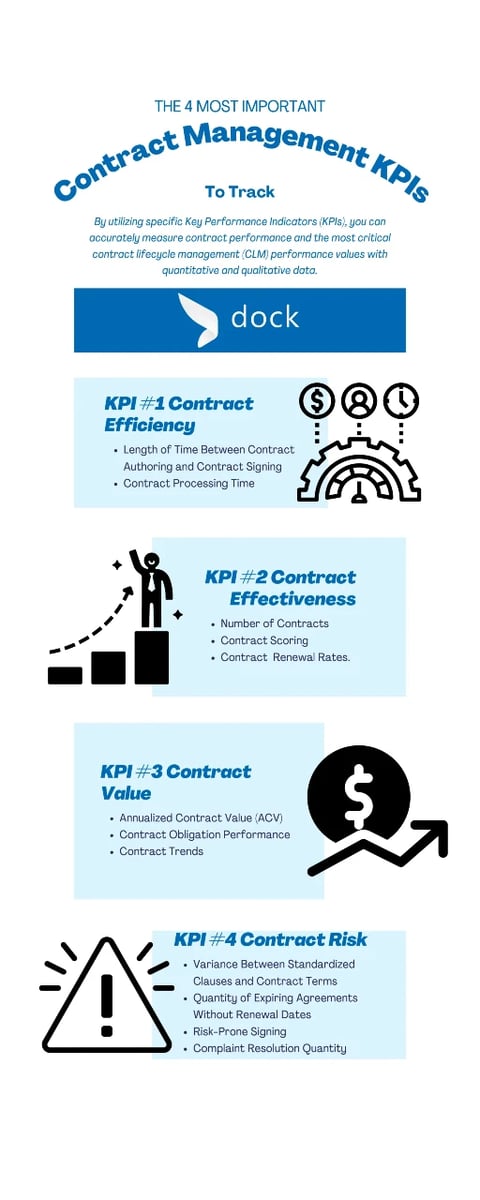_11zon-1.webp?width=1280&height=853&name=1ruthson-zimmerman-Ws4wd-vJ9M0-unsplash%20(1)_11zon-1.webp)
How to Set KPIs For Your Legal Department
So how do you go about developing KPIs and how can you ensure that your team is tracking the most important ones that are suited to your company? What is the process like of tracking these metrics? We’ll discuss all this and more so you can assist your legal team with all the data they need to enhance their strategy.
Content-
- What is a KPI (Key Performance Indicator)?
- What is the purpose of legal KPIs?
- Legal data – How do you work with it effectively?
- How should my legal department determine and set KPIs?
- Which legal KPIs are most important to track?
- So – where do you go from here?
- Gain the Competitive Advantage Today With Dock 365
What is a KPI (Key Performance Indicator)?
A key performance indicator measures the success of how current practices and operations lead to results – or lack thereof. Utilizing key performance indicators for reporting within businesses is a very, very common practice. KPIs offer insights on metrics that companies, departments, teams, and individual employees monitor to consistently oversee performance and to understand which areas need optimization. In regard to a company’s legal department, legal will leverage KPIs within their growing businesses to ensure that their operations are conducive to the needs and goals of the company.
The KPIs that your legal team sets in place should correlate with business objectives, and metrics pertaining to an effective contract lifecycle management process are necessary to track to assess contract performance in relation to business growth and revenue.
What is the purpose of legal KPIs?
For your in-house legal department, KPIs serve to measure progress in relation to the goals that your team is working towards. Businesses need legal teams that can add value, and by using KPIs as a measuring stick, you see their proven value in the numbers. If other departments leverage KPIs, then why not legal too? You might be asking yourself what’s the best way to go about tracking KPIs and how do you determine which ones are most necessary to monitor? Can you measure the performance of your legal team based on these data points? We’ll dive into that below.
Legal data – How do you work with it effectively?
Working with legal data can be difficult, and it takes an overwhelming amount of legal knowledge to do so efficiently. Examining legal data is much different than analyzing data pertaining to other departments like product, sales, and finance. When working specifically with legal data, we recommend keeping these key concepts top-of-mind:
- Data on its own is insufficient. It’s important to have an awareness of the issues that need to be resolved instead of only relying on data points. Use data to inform your next activities so you can mitigate the same issues and bottlenecks.
- Be selective with your data collection, not all of it is important. Filter your data early on so that you measure relevant and helpful metrics. Focus on high-ticket items first!
- Collect data with your existing technology – you don’t always need something new. Your Microsoft Office 365 serves as a powerful solution for gathering key data points. No need to invest in new technology when your current systems can serve the data analysis and reporting function phenomenally.
- Understand the necessity of data to maximize your processes. Your employees may need training reviews or even entirely new, comprehensive training on how to manage data, develop tests and experiments, and analyze results and performance. In this way, you can create a data-driven culture that keeps your business growth and success on the incline across departments.
These four elements are some of the most important to stay mindful of when it comes to developing and monitoring KPIs within your legal department.
How should my legal department determine and set KPIs?
Before you go ahead and select which legal KPIs to track, we recommend gaining an understanding on two concepts:
(A) What are the goals our business?
(B) What are the goals that the business has for the legal department?
These items are essential to examine because the legal team needs to have objectives that match the business at-large. For example, say your business has set a specific financial goal. This means that your legal department’s KPIs should consist of metrics that measure data points directly influencing this financial goal. In addition, legal should be on board with the goals that the company itself has set for the legal team.
Legal is foundational to risk mitigation, supporting reviews, and various other practices and operations that require the eye of the legal team. However, legal departments need to stay in communication with other departments to see where their assistance may be able to fill in the gaps. By opening up lines of communication with other departments, you can add value by enhancing their efforts with your professional legal insights and knowledge.
Which legal KPIs are most important to track?
Now you’re ready to begin tracking legal KPIs for both contract management and business success. There isn’t a tried-and-true set of KPIs that all legal teams default to, but there are some that are very commonly tracked. Try them out within your legal department and see if they’re the right data points to be keeping tabs on within your organization. Many growing businesses use the metrics below, but every business is unique – so test different metrics out and see which ones are most conducive to your business’s needs.
- New projects: Every project should be categorized and appropriately documented by time, date, type, and other classifiers that help distinguish one project from another. This way, your legal team has a clear understanding of incoming tasks and activities so they stay proactive.
- Costs and time required per project: Make a rough estimate of how much money and time will be invested in a given project – this allows you to plan appropriately. You can also pinpoint where delays and areas of potential exist with this piece of data.
- External spending: Legal teams want to minimize external spending as much as possible, and this metric is incredibly easy to monitor on your user-friendly dashboard. Depending on the capabilities of your dashboard, you can classify financial data by a given project’s level of risk and/or complexity.
%20(2)%20(1).webp?width=731&height=548&name=5%20Common%20Steps%20During%20the%20Records%20Management%20Stage%20(1)%20(2)%20(1).webp)
- Duration of the contract review period: Contract reviews can take a substantial amount of time to ensure that every detail contained in a legal agreement is appropriately conveyed. Legal departments will often make the investment in contract automation software to improve upon contract review times.

- Miscellaneous contract metrics: Other relevant contract metrics that might assist your legal department include data points such as average contract value, cost per transaction, average contract turnaround time, and percentage of contracts negotiated.

To begin tracking legal KPIs, we recommend leveraging an intuitive and cost-efficient contract lifecycle management system provided with smart analytics and reporting tools for your company’s contracts. You can even leverage features like a cloud-secure contract repository and customizable contract request forms for a smooth contract intake process, making things extra simple for your legal team from the beginning of every contract.
So – where do you go from here?
The key takeaway is to simply start. Begin tracking legal KPIs so you can make data-driven decisions and take well-informed actions pertaining to your legal department’s projects. With all of the important data at your fingertips, you can easily determine which metrics to focus your efforts on and how they influence the overall performance of your company.
Start with your contracts to create an environment driven by the data in all of your departments – but most especially legal.
Gain the Competitive Advantage Today With Dock 365
Tracking legal KPIs is easier than ever with the Dock 365 Contract Management System. Gain immediate insights on key metrics and legal data with dashboards, reporting, and automated report sharing so you can keep all key stakeholders across your company’s departments in-the-loop of the most current legal and contract trends.
The Dock 365 Contract Management System is a Microsoft 365 and SharePoint based software solution that can help you improve your contracting processes. Transition easily to our solution by using your existing Microsoft investment, and we’ll help you get started with unlimited system training and user support. Begin to improve your productivity levels, manage risk, and overhaul your contract lifecycle management processes today with us here at Dock 365.
Learn more about our Dock 365 Contract Management System here.
Learn more about Contract Lifecyle Management (CLM) Software here.

Written by Lindsey Paulk
Lindsey Paulk is a Content Writer in Jacksonville, Florida that specializes in digitally communicating all-things contract management.
Reviewed by Naveen K P
Book a Live demo
Schedule a live demo of Dock 365's Contract Management Software instantly.




